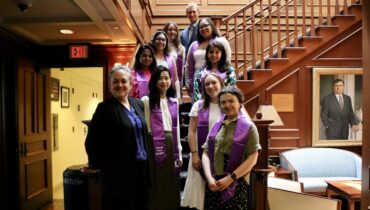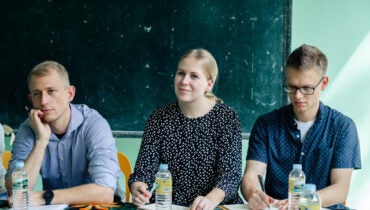Ndeye Radia Mbengue and Emma Dorshimer are the first students to receive Georgetown’s new graduate certificate in Gender, Peace and Security (GPS).
The certificate focuses on bringing a gender analysis to conflict, peacebuilding, and stability—a crucial skill for those entering International Affairs, especially given the new United States law that mandates women’s inclusion in peace and security efforts.
Both Dorshimer and Mbengue graduated in December 2020 with Masters’ Degrees in Conflict Resolution, along with the certificate, which is administered by the Georgetown Institute for Women, Peace and Security (GIWPS).
“We’re so proud of our inaugural cohort of students, including Radia and Emma who graduated this winter,” said Amb. Melanne Verveer, executive director of GIWPS. “Their robust understanding of gender, peace and security—indicated by their achieving our certificate—makes them better qualified for future positions and ultimately more effective professionals in those roles.”
A New Perspective
Emma Dorshimer says some people see women’s issues as a niche subject, but it’s actually a lens through which to view the world.

“Being able to look at conflict resolution and post-conflict reconstruction through the lens of gender—recognizing that women and other marginalized groups have different experiences—allows you to do your job better, and allows you to resolve conflict better and create better programming.”
Dorshimer, who has a Bachelor’s degree in cultural anthropology and is interested in youth leadership and programming, completed a field fellowship with the gender-based violence and emergencies team at UNICEF during her time at Georgetown.
She says this graduate certificate is special because it’s organized by GIWPS.
“We have a group of professors and scholars at our fingertips that are so knowledgeable and have so much experience.”
Career Advancement
Ndeye Radia Mbengue, who has a background in research and is trying to shift to program management, appreciated the certificate program’s emphasis on practical skills like gender-sensitive budgeting, audits, and mainstreaming.
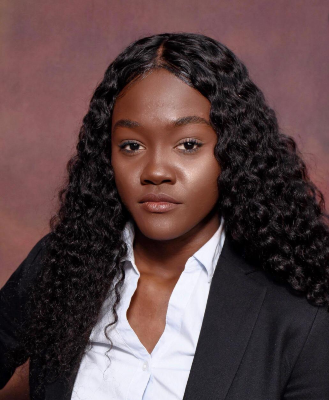
“I took the Gender & Security Toolbox course as I was doing a monitoring and evaluation internship with Vital Voices,” said Mbengue. “During the course we had a lot of material on monitoring and evaluation, so it helped me a lot.”
Originally from Senegal, Mbengue says she also welcomed the professors’ discussions of feminist, non-exploitative research methods, and the interesting guest speakers in the foundational course.
“I recall one interaction with an activist [guest speaker] who was based in Nigeria and her telling us about her experience and women’s experience with Boko Haram in general.”
Inaugural Cohort
Around 25 other graduate students from programs across Georgetown University are currently pursuing the graduate certificate in Gender, Peace and Security—several of whom will graduate this May.
“Scholars and policymakers alike increasingly recognize the importance of understanding the gender dynamics of international affairs,” said George Shambaugh, director of the Master of Science in Foreign Service (MSFS) program. “The gender, peace and security certificate enables Georgetown students — especially those in the flagship Master in Foreign Service Program — to develop an expertise that will serve them well throughout their careers.”
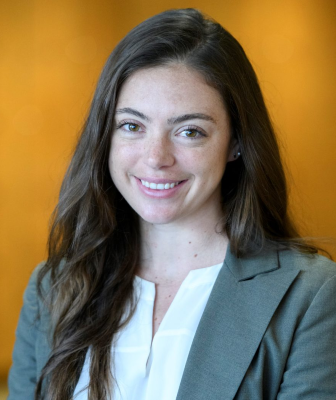
Elena Scott-Kakures, a second-year student in the MSFS program concentrating in Global Politics and Security, is on track to graduate with the GPS certificate this spring.
Scott-Kakures says her favorite courses include Gender & Terrorism, also offered by GIWPS, which complemented her interest in “women as perpetrators of violence, women as victims of violence, and women as mitigators of violence.”
Another favorite course on the Afghan peace negotiations was taught by Vice President Kamala Harris’s National Security Advisor and former MSFS director Nancy McEldowney. Scott-Kakures and classmates worked directly with a Kabul-based women’s organization to help them identify ways to better leverage their standing and representation in official and parallel peace negotiations and discussions.
“Now I feel much more competent writing gender analyses,” says Scott-Kakures, who co-chairs the School of Foreign Service MENA Forum and is in the process of transitioning to a full-time role at the U.S. Department of State.
Including All Members of the Community
Jennifer Grosman Fernández, who is also in the MSFS program, is pursuing the certificate because of her interest in the gendered dimensions of climate change and climate-related conflict.
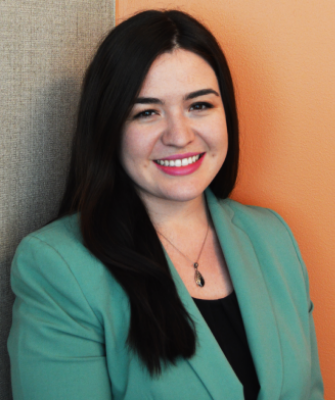
At first glance, she says, the connections between gender and climate change may not be obvious. In her experience, taking coursework towards the certificate underscored that “we can’t reduce emissions as quickly as we need to if we don’t include all members of our community, and we can’t prepare for a climate-altered future if we exclude certain perspectives and inputs.”
Grossman Fernández served as a research assistant with GIWPS, where she helped research and write a report titled “The Climate-Gender-Conflict Nexus,” and she also interned with the United Nations Framework Convention on Climate Change.
She recommends gender-focused courses to any student, regardless of their degree background, and encourages them to give it a try.
“Even if you’re new to gender studies as a whole, there’s a lot you can learn even in just one class. You don’t have to commit to the whole certificate, and you shouldn’t feel intimidated by it if it’s a brand-new field for you,” said Grossman Fernández.
Current or prospective Georgetown students who are interested in the graduate certificate or GIWPS courses can find more information here.

